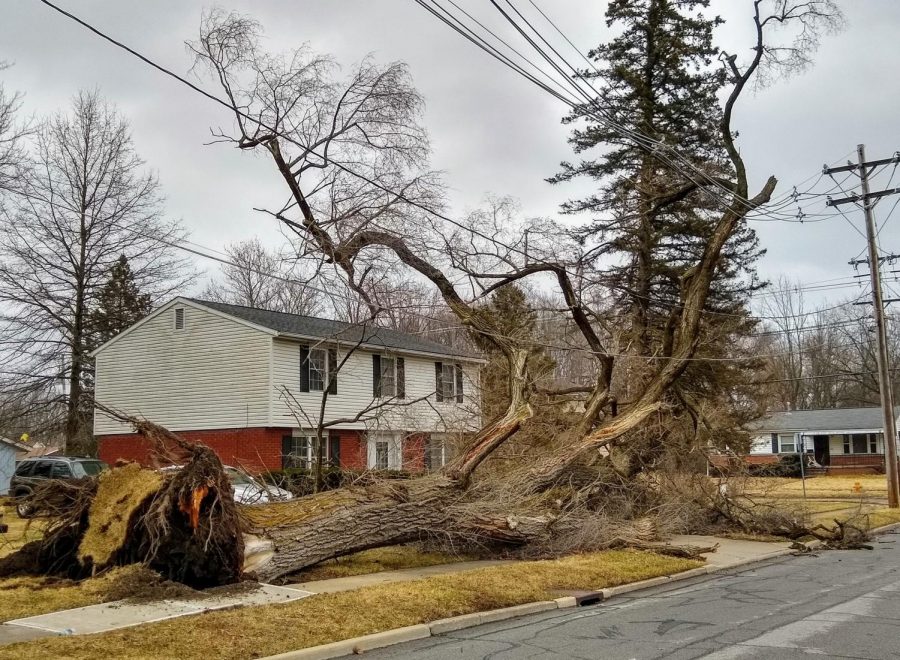Windstorm Whips Through Northeast Ohio
Photo Courtesy of Bryan Burgess
This tree on the corner of Edison Street and Pleasant Street was one of many uprooted during last Sunday’s wind storm.
It was a blustery weekend across the Midwest and Northeast, as winds reaching 65 miles per hour uprooted trees, damaged buildings and vehicles, and triggered power outages.
Just down the road in Cleveland, a brick wall fell on a parking lot full of cars and left destruction in its wake, according to Cleveland 19 News.
David Orr Associate Professor of Environmental Studies and Associate Professor of Biology Roger Laushman said that the storm was caused by the interaction of two different pressure systems.
“Wind speeds and gusts are related to the pressure differential between high and low pressure areas,” Laushman wrote in an email to the Review. “We had a large high pressure system west of us and two low pressure systems east of us, which generated the strong local winds.”
Fortunately for residents and students alike, Oberlin was spared from much of the storm’s wrath. A couple of trees fell down, but property damage was minimal and power was lost briefly only twice.
“For the most part, Oberlin fared very well for the amount of wind and the gust magnitude that had come through,” said Oberlin Municipal Light and Power System Distribution Superintendent Matt Horwedel.
City Council President Bryan Burgess emphasized that this weekend’s storm was not as destructive as Oberlin’s previous major windstorm, a microburst in the fall of 2016.
“The last time we had a major windstorm, it was a little over two years ago,” Burgess said. “Power was out for about three days. … It’s probably the worst natural disaster Oberlin’s had in years and years, at least in my living memory. So what happened yesterday was nowhere near that.”
According to Horwedel, residents on the east side of Oberlin were likely the most impacted.
“Primarily the east side of residential customers were the bulk of who experienced the outage,” he said. “That was due to a very large tree on Edison Street [that fell] over and landed on the high voltage lines.”
The tree on Edison Street didn’t directly cause an outage but the power had to be turned off in order for the tree to be safely removed.
“The only way that the three guys could safely clear the way was if we turned off the power for them to do the cutting,” Burgess said. “We don’t mind [those kinds] of repairs. We [gave] out the notice ahead of time.”
While Burgess can’t pinpoint whether these kinds of wind events have increased in recent years, he did say that city policies — including the upcoming revision of the Oberlin Climate Action Plan — are made with climate change in mind.
“We take it as a given that climate change is happening,” Burgess said. “It isn’t something to be prevented in the future — it’s something to deal with in the present”
According to Laushman, evidence suggests that storms like these will be exacerbated by the changing climate.
“It isn’t easy to predict how local winds will be affected by climate patterns, but it is predicted that some places will have decreased winds while others will have increases,” he wrote. “Westerlies, which are the prevailing winds in our region, are predicted to increase according to a study published last July. [This is] correlated with increased CO2, so a direct consequence of climate change.”
Plans to address the impacts of severe weather events — like this weekend’s storm and the recent polar vortex — will be unrolled in the revised Oberlin Climate Action Plan.
“We have the new climate action plan written now,” Burgess said. “It’s under [the] review process. It’ll be passed sometime, probably in June.”
For now, Burgess and Horwedel both emphasize that Oberlin was fortunate this time, but the importance of preparing for severe weather events can’t be overstated.
“On the preventative side, we have selective tree plantings that won’t cause a problem,” Burgess said. “[For] the trees that are there, we have preventative maintenance cutting to keep it from becoming a problem. We keep emergency crews on standby, but that’s not just for storms — that’s seven days a week.”
Horwedel added that residents who notice any issues with fallen trees or downed power lines should immediately contact local authorities so the problem can be addressed swiftly.







